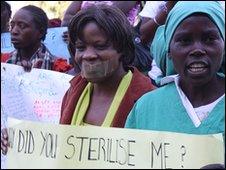Namibia HIV women sue over forced sterilisation
- Published

Solidarity marches are also planned in Zambia, South Africa, the UK and US
Three women in Namibia are suing the state for allegedly being sterilised without their informed consent after being diagnosed as HIV positive.
The women say the doctors and nurses should have informed them properly about what was happening.
The rights group representing them, the Legal Assistance Centre, says it has documented 15 cases of alleged HIV sterilisation in hospitals since 2008.
A march in their support is taking place in Windhoek as the case begins.
The BBC's Frauke Jensen in the capital, Windhoek, says there are around 300 people on the march.
Most of them are women, and they have been chanting slogans such as: "My body, my womb, my right", and holding placards reading: "Why did you sterilise me?"
They are also planning a sit-in protest on Wednesday at two of the hospitals where the alleged sterilisations took place, our reporter says.
'Equality for all'
The women taking their case to court want 1m Namibian dollars ($130,000, £90,000) in compensation from the health ministry.
Gladys Kamboo, a spokesperson for the ministry, said she could not comment on the case while it was being heard in court, but insisted that the ministry had not done the women any intentional harm.
The Legal Assistance Centre (LAC) says the High Court has granted that the women's identities should not be revealed to prevent "further discrimination and stigmatisation because of their HIV status".
"We want a health system based on human rights which promotes equality for all," the LAC's Amon Ngavetene told the BBC News website.
He explained that when HIV-positive women go to hospital they are sometimes, at the discretion of the doctors, advised to undergo a sterilisation operation.
Mr Ngavetene said these women are not always given a clear idea of what the procedure involves and dangerous pre-existing conditions are not always taken into account.
There may also be a language barrier in a country where there are 11 indigenous languages, he said.
As well as the march in Windhoek, other solidarity marches are planned on Tuesday in South Africa, Zambia, the UK and the US.
- Published27 May 2010
- Published28 May 2010